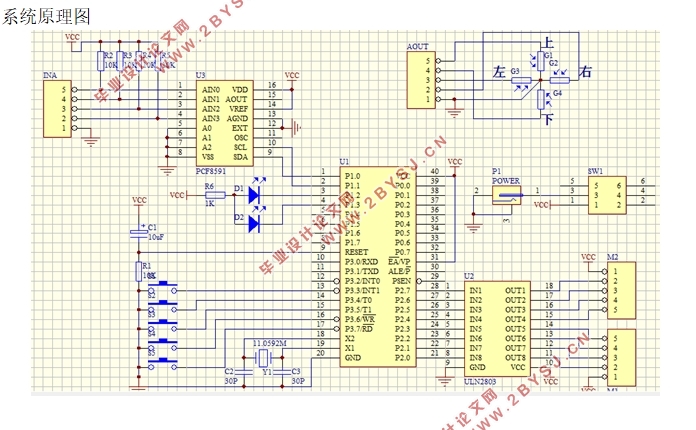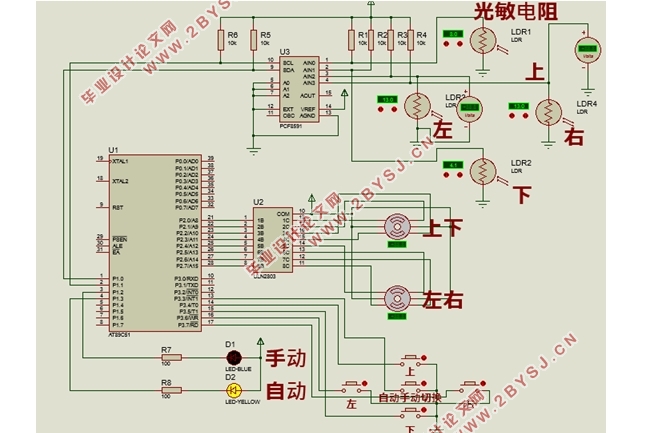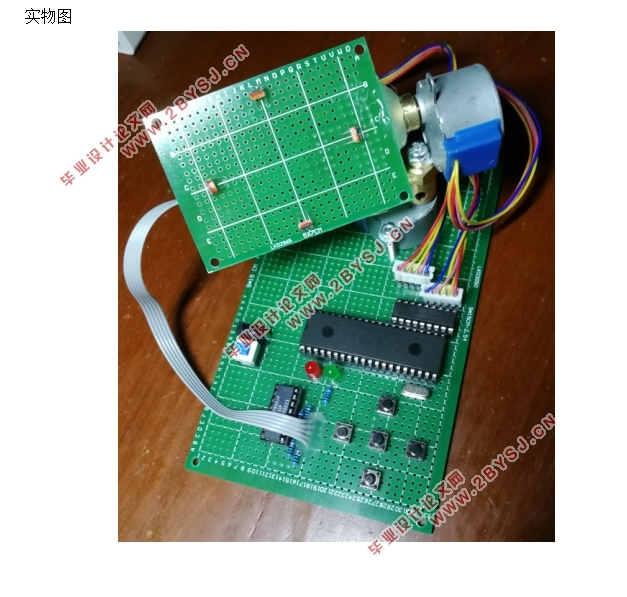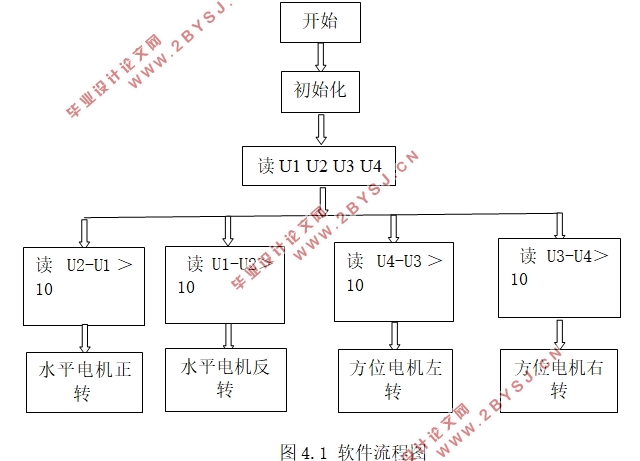基于单片机的太阳跟随系统设计
无需注册登录,支付后按照提示操作即可获取该资料.
基于单片机的太阳跟随系统设计(任务书,开题报告,外文翻译,论文13500字)
摘 要
随着经济的发展,各种能源的使用越来越快,特别是最重要的能源,煤炭资源的短缺,促使人们寻找替代能源的步伐不断加快。太阳能具有可再生、丰富、洁净、价廉等优势,拥有良好的发展前景。
在太阳能的发电过程中,利用效率偏低,改变太阳板的形状、面积等都可以提高效率,但太阳板受光照的面积是决定太阳板光电转换效率的关键。本设计用传感器(光敏电阻)把收到的光信号变换为电信号,经过处理以及单片机的控制后,由相应的控制数字信号驱动步进电机对方位角和高度角进行改变,以此来实现太阳板位置的调整。
论文主要研究了选用STC89C52单片机作为主控芯片,根据单片机的功能和所需要的功能,重点完成了单片机外围硬件电路的搭建和相应软件的设计。
研究结果表明:与固定的太阳板相比光电转换效率提高了35%。
关键词:太阳能;单片机;光敏电阻;步进电机
Abstract
With the development of the economy, the use of all kinds of energy is getting faster and faster, especially the most important energy, the shortage of coal resources, and the acceleration of people's search for alternative energy.Solar energy has the advantages of renewable, rich, clean and cheap, and has a good development prospect.But solar power is inefficient, a factor that has hampered the spread of solar technology.
In the process of solar power generation, the utilization efficiency is low, and changing the shape and area of the solar panel can improve the efficiency, but the illuminated area of the solar panel is the key to determine the photoelectric conversion efficiency of the solar panel.This design with the sensor (Photoresistor) convert the light of the received signals to electrical signals, after processing and single-chip microcomputer control, step motor driven by a digital signal control was carried out on the azimuth Angle and height change, so as to realize the sun plate position adjustment.
Thesis mainly studied the STC89C52 microcontroller chosen as the main control chip, according to the function of the single chip microcomputer and the required functionality, mainly completed the construction of the single chip computer peripheral hardware circuit and the corresponding software design.
The research results show that the photoelectric conversion efficiency is improved by 35 % compared with the fixed solar panel.
Key Words:Solar energy;Single chip microcomputer;Photoresistor;Stepper motor
1.3 本文的研究内容及章节安排
本论文设计一个太阳能电池板转动控制装置,该装置的目的是使太阳能电池板自动跟随太阳的运动,实现太阳光最大化采集,从而有效的利用太阳能。采用光敏电阻作为传感器的双轴跟踪系统,使太阳能板能一直得到最大化的阳光采集量从而提高太阳能的利用率。
主要内容:
1)分析太阳的转动,设计合理的跟踪方式。
2)根据光敏电阻的功能和它的特性,设计光电检测模块。
3)分析控制芯片的功能及要求,设计控制模块。
4)根据芯片的功能设计驱动电路,控制步进电机的转动。
5)根据硬件电路,进行软件设计。
论文共分为五章。
第一章对论文的研究背景和意义进行了介绍,说明了太阳能作为一种新型能源的特性,人们从二十世纪中期就已开始研究怎末提高太阳能的利用率了,到现在已经取得了一定的成就。介绍了本设计需要研究的内容,简单讲诉了思路。
第二章对当今跟踪系统跟踪方式进行了一些介绍,通过比较选用了光电追踪的方式,通过对单轴和双轴原理和特点的比较,采用了双轴跟踪的方式。另外,大体上简述了所运用的设计方案和原理,给出了研究的步骤。
第三章对太阳跟随系统硬件进行了分解,重点介绍了系统中的重要组成模块,单片机模块,光电检测,A/D转换,步进电机,还简单介绍了一下小部件。最后介绍了实物的具体搭建。
第四章描述了系统中软件设计的流程图,对主要模块软件编写惊醒了描述,还给出部分核心代码,以增加对代码的了解。
第五章对论文进行了总结,指出了一些不足并提出了一些没有实现的想法,还有对未来太阳能开发利用的展望。




目 录
第1章 绪论 1
1.1 研究的背景和意义 1
1.2 国内外的研究现状 2
1.3 本章的研究内容及章节安排 3
第2章 系统的总体设计 4
2.1 跟踪方式 4
2.1.1 光电跟踪法 4
2.1.2 单轴与双轴跟踪 5
2.2 系统总体设计及分析 5
2.2.1 系统总体设计 5
2.2.2 系统总体设计分析 6
第3章 系统的硬件设计 7
3.1 单片机控制电路 7
3.1.1 复位电路 9
3.1.2 晶振电路 9
3.2 光电检测设计 9
3.2.1 光电传感器 9
3.2.2 光电检测原理及电路设计 10
3.3 A/D转换模块设计 11
3.4 电机驱动模块设计 12
3.4.1 步进电机的介绍 12
3.4.2 四相步进电机及其控制方式 13
3.4.3 步进电机驱动电路 13
3.5 实物平台搭建 14
第4章 软件设计 15
4.1 按键部分 15
4.2指示灯部分 16
4.3模数转换部分 16
4.4 驱动电路部分 18
4.5 数字信号传输部分 20
第5章 总结与展望 22
参考文献 23
附录A 24
附录B 25
附录C 26
致谢 27
